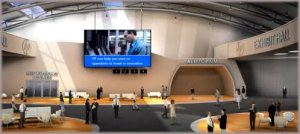Archive
Where are Virtual Events Headed?

The idea of “virtual events” has actually been with us almost as long as the web itself (well, OK, maybe not all the way back to ARPAnet, but you get the point). Through the years, online chats, webcasts, webinars, videoconferencing, and podcasts have offered us with options to carry on seminars, meetings, and conversations online.
Today, comprehensive “virtual event” technology platforms support entire conferences, trade shows, private exhibitions, product launches, job fairs, corporate training, and just about any other type of event you would hold in person – conducted online using only a web browser.
These environments are often based on the model of a corporate campus, convention center or exhibit hall replete with booths and sales staffs, an auditorium for breakout sessions, and even a lounge where attendees can ‘chat’ with each other. The providers of these environments have done a great job at combining several interactive and content delivery elements into one nice neat package.
Among the largest and most successful virtual event technology platform providers to date include companies like 6Connex (who provided the sample virtual event image above), UnisFair, InXpo, and On24. Several other large corporations and early adopters on the client side have also begun to develop their own custom in-house virtual event capabilities.
It’s not hard to understand the growing attraction to this technology. There are a lot of business, social, and economic factors drawing marketers and clients to virtual events. Just a few of these include:
- Corporate budget & travel constraints
- Large geographic distribution of event attendees
- International events with multilingual content requirements
- Extending the length of time to reinforce marketing messages
- The “green” movement (reducing carbon footprint, paper use, etc.)
- Ability to leverage existing digital content and assets
- Demand for detailed event metrics to demonstrate ROI
So who are the key influencers that have shaped virtual events as we know them? And, just as importantly, what impact will these influencers have on the continuing evolution of virtual events?
My take is that early on, event marketers and their clients have had most of the influence on virtual event platform development. Most technology platform providers initially set-up events in a “virtual trade show” format, with multiple companies displaying their products and services in booths that resided in exhibit hall environments. Event marketers and their corporate event marketing clients quickly related to this model because of its familiarity. They also understood its ability to extend the reach of live events, appeal to new audiences, and more clearly measure event ROO and ROI with detailed web metrics. Since event marketers have been among the earliest and most prominent adopters of virtual event technology, their influence has spurred a continued refinement of virtual event types, formats, features, interface variety, and content management capabilities, while retaining (for the most part) a foundation of standalone events with a definitive “shelf life”.
More recently, web and digital marketers, along with their corporate marketing clients, have begun to exert their influence in the virtual event space. In the interest of creating customer “communities”, they have naturally gravitated to supportive technologies like social media, and are now becoming similarly attracted to virtual events. Their impact is being seen in the push for integration of social media into virtual events, as well as the idea of more “persistent environments” with a much longer-term existence. Virtual event technology providers have in turn responded by expanding their offerings to include these features in their platforms.
Another emerging influence will soon be coming from virtual event attendees. As they become more experienced and discriminating, they will also become more vocal with their feedback, and will have an increasingly larger impact on the future direction of virtual event evolution. While the jury is still out on this group, my bet is that accessibility, responsiveness, usability, content, and overall quality of experience will be their hot buttons.
I think this combination of event-centric, community-centric, and user-centric forces shaping the direction of virtual events is healthy. It will continue to drive technical innovation and ultimately deliver greater business value to the users of virtual events and environments. What do you think?
Will virtual events eventually fade off into the sunset, as just another passing fad? Will they remain as standalone event web sites with a defined “shelf life”? Will they become permanent virtual business environments? Could they even become a replacement for the cookie-cutter corporate web sites that we see so often today? Or, like most evolving technologies, will the best features of virtual events end up somewhere – and everywhere – in between?
– Jim S.